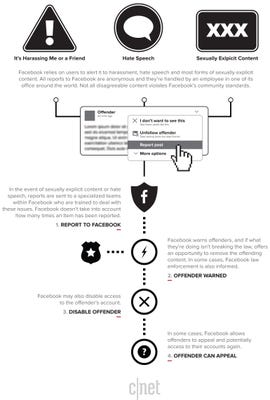When illicit photos of Anisha Vora began showing up online, she didn’t know what to do. She contacted Facebook, Twitter and other companies hoping they’d do the right thing and take the photos down. But soon, there were too many places for her to deal with on her own.
What happened to Vora happens to all sorts of people. Students, college graduates and professionals. People have lost their jobs because photos were published online without their consent. Most of the victims are women, though not all.
As the threat of revenge porn has grown, companies, organizations and even lawyers have sprung up to help victims.
Figure out the size and scope of the problem

Mark Hobbs / CNET
The moment your photos begin circulating online, it’s easy to get overwhelmed. You’ve been violated, and suddenly your name, phone number, address and naked images are being published on sites around the Web.
If someone posted these images to Facebook, Twitter or another reputable site, it’s relatively easy to report the images and begin the process of asking the sites to take them down.
Less reputable sites aren’t as easy. Some might demand a payment to remove listings. In those cases, don’t give in.
Instead, go to companies like DMCA Defender, a Kansas City, Mo.-based service that scans the Web for free to help figure out how far and wide your photos have been sent. The company started out as a service to help artists enforce the Digital Millennium Copyright Act, a 1998 law that attempted to update US copyright rules to apply to the Internet.
About 70 percent of DMCA Defender’s staff now works on revenge porn issues, and they charge about $6 per site for takedown services. It also works with minors for free. The company also offers services to regularly search for photos in case they pop up in new sites.
The way they work is mostly to send takedown demands to websites. When those don’t work, they ask search companies like Google, Yahoo and Bing to remove them from listings instead.
“You’re not paying for a service that you wanted,” said co-founder LaMonica Wallace. “These are victims.”
These takedowns don’t always work. Sometimes, online companies ask for proof of a copyright before agreeing to remove the photo, stalling the process and potentially further traumatizing the victim.
Hide the photos
If trying to get photos taken down doesn’t work, there’s another option: Flood the Internet with lots of other stuff about you. This is where Reputation.com comes in. The service, based in Redwood City, Calif., creates a network of website postings designed to push all the negative stuff about you down search rankings as much as possible. The theory is the further someone has to click on Google or Bing to find negative information about a person, the less likely that info will impact their lives.
“We flood the robots with positive information about you that’s accurate and true,” said Karissa Sparks, vice president of marketing at the site. “It can work and it does work.”
Why not use takedown requests like DMCA Defender does? Sparks said Reputation.com followed that route in the beginning, after it launched in 2006. “What we discovered was that isn’t particularly effective,” she said.
The service, which has been around since 2006, can cost as much as $10,000 for a typical case, depending on the number of bad websites out there with your information already. Revenge porn cases represent a small percentage of the company’s business, but they know how to handle it.
When it works, Sparks said customers say they feel like they can breathe again. “They got their life back,” she said. To them, “Everything was at risk: their career, their family.”
Find a lawyer
Law firms are increasingly focusing on Internet issues, and there’s a growing group of lawyers who specialize on revenge porn.
“People will go through substantial stretches to have content removed with no results, and that’s where we come in,” said John Arsenault, a Denver-based attorney whose firm specializes in takedown demands. Often times, he’s found, a request to remove images is more effective when it comes from a lawyer’s letterhead or a persistent series of calls. “I prefer to get results.”
He said most lawyers charge between $500 to upwards of $1,500 — or more — depending on the content and number of “takedown notices” that are needed to be sent out to sites to remove unauthorized content.


End Revenge Porn/Screenshot by CNET
Removals can take just a day or two, or as long as several weeks or months, said Cleveland-based attorney Aaron Minc, who writes a blog about defamation removal. His clients include “celebrities, politicians, millionaires and even billionaires,” in addition to the general public. He declined to give names, citing attorney-client privilege.
Minc said in addition to seeking out a lawyer, victims should also file criminal charges, if appropriate.
“The Internet, it touches everybody,” Minc said. “Removing things off it depends on a lot of different factors, the type of sites, the country where the server is located, all of that factors into the equation because it can have a very devastating impact on a victim’s life.”
Get help for yourself
Finally, it’s important to remember that this type of invasion is an attack that can leave terrible emotional scars. Counseling is an option. Getting involved is another.
Vora is now a victim outreach coordinator at the Cyber Civil Rights Initiative’s EndRevengePorn.org. There’s also Without My Consent.






